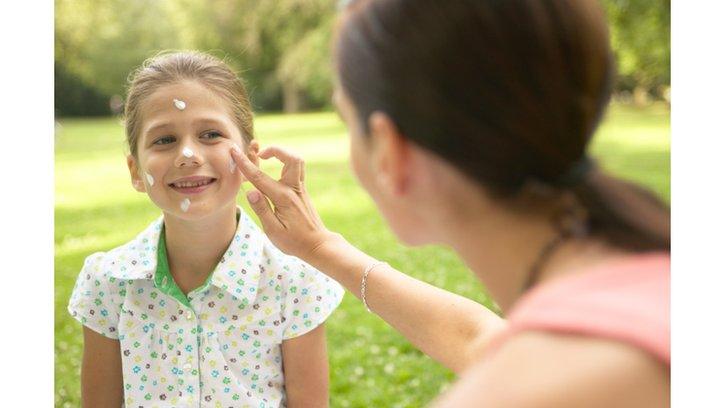Sun cream: Children 'getting sunburnt' in Wales schools
- Published
'Always wear sun cream and protect your eyes'
There are calls for a country-wide policy on sun-safety in schools after claims children are getting sunburnt.
There is no blanket guidance to keep children protected and councils in Wales say it is up to individual schools.
Unions advise teachers not to apply sun cream to children, and some schools do not allow pupils to bring their own in because of allergy concerns.
But parents said one application of sun cream before school is not enough.
The charity Tenovus Cancer Care says one blistering sun burn as a child can double the risk of skin cancer in later life, and called for the Welsh Government to make education on staying safe in the sun to be compulsory in schools.
The government said schools have a duty of care to children and should agree a local approach to the issue.
Caitlin Sandford, 24, from Aberystwyth, has psoriasis, external on her hands, a skin condition which means she cannot apply sun cream to her child.

Caitlin's son Samuel, pictured with his younger brother, has come home from school sunburnt
"I brought some in but the teachers said they could not apply it and my son would have to apply it himself, apparently he didn't even have help since he came back with sunburn on the back of his neck," she said.
"I understand being worried about allergies but if you provided the sun cream and your child has trouble putting it on a teacher should help.
"Especially considering sun cream probably won't be very effective at lunch break if it was applied at 8:30 in the morning."
However Louise Jeffreys, from near Aberystwyth, highlighted concerns of cross-contamination to children who have allergies if teachers are applying sun cream brought in by pupils.
Sun Cream: Are you applying it properly?
The skin cancer charity Skcin said sunscreen needs reapplying at least every two hours to provide adequate protection.
Leigh O'Connor, from Caerphilly, said his son's school does not allow pupils to bring in cream to apply themselves due to allergy worries, and his son has overheated and other children have burnt.
"It started up recently with the hot weather. It seems to be that every school has a different policy," Mr O'Connor said.
"My son's school doesn't allow it. It's a bit of a nightmare, really."
He has started a petition, external calling on teachers at all schools to be allowed to apply sun cream with parents' consent.
"I have had quite a lot of feedback from other parents - one mum told me there were three incidents where her child burned before the school changed policy," he added.
Caerphilly council was asked to comment.
So what is the law?
In short, there isn't one.
Most councils which responded to BBC Wales said it was up to individual schools to decide what is best.
But Wrexham council said guidance to its head teachers advises it is "reasonable" for schools to apply hypoallergenic sun cream if a child has not been provided any or is unable to apply it.
Conwy council said staff were not prevented from applying or helping pupils apply sun cream and it provides a sun safe policy to all schools to be shared with parents.
And Powys said while it was up to individual schools, it does provide advice from Cancer Research UK, external which includes the use of sun cream. Ceredigion said staff can help children who are too young to apply cream with parental consent, but again it is up to individual schools.
However, a Flintshire council spokesman said: "Schools will usually work on the basis that if a child brings in sun cream, it is for them to apply themselves and not a member of staff."
The Welsh Government said: "Schools have a duty of care to pupils and should actively engage with parents to agree a local approach to the provision and application of sunscreen so that warm weather can be enjoyed safely."
Public Health Wales provides advice as part of the Healthy Schools Framework, which the government expects all schools to consider.
Schools in Wales can also sign up to Sun Safe Accreditation, external, a partnership between Skcin and Tenovus to educate children about sun safety.
Tenovus has visited more than 90 primary schools in Wales since the partnership began in May, delivering sun safety workshops and assemblies and creating lesson plans. More schools are booked to take part in September.

Tenovus and Skcin have been educating primary pupils about sun safety
St Nicholas Church In Wales primary school in Vale of Glamorgan said: "The children were all very enthused by the assembly. They recalled the song from last year and have been singing it on the yard ever since.
"We have used the cues and ideas to develop our school grounds and plans."
Kathryn Clifford from Skcin said the issue was one that was UK-wide and the charity spoke about it during a parliamentary event in the House of Commons on Wednesday.
"The issue of policy and sunscreen in primary schools is without doubt the hardest nut to crack," she added.
"Excuses from schools not to complete the accreditation due to mandatory stipulations within our policy come in various forms - the greatest obstacle being the provision and/or application of sunscreen."
What does the union say?
While some councils say teachers are free to apply sun cream to pupils as necessary, the National Union of Teachers (NUT) in Wales advises them not to "due to the potential for allegations of abuse" and the time it would take.
The NUT said if schools allow staff to apply sun cream, parental consent should be obtained and staff who wish to do so should only apply it to the face, neck and arms.
It says parents should be encouraged to provide protective clothing and hats, and schools should amend the uniform and timetables as necessary in summer and provide shady areas.
David Evans, Wales Secretary for the NUT, said: "Each school should have a policy on the administration of sunscreen, which encourages parents and carers to provide children with their own, as well as encouraging them to provide children with suitable long-sleeved clothing and wide-brimmed hats.
"Our members can apply sunscreen in certain circumstances, but this will be with written permission from parents and a suitable risk assessment carried out. Children can have allergies or intolerances to certain products, which we would be keen to avoid."
Why does it matter?
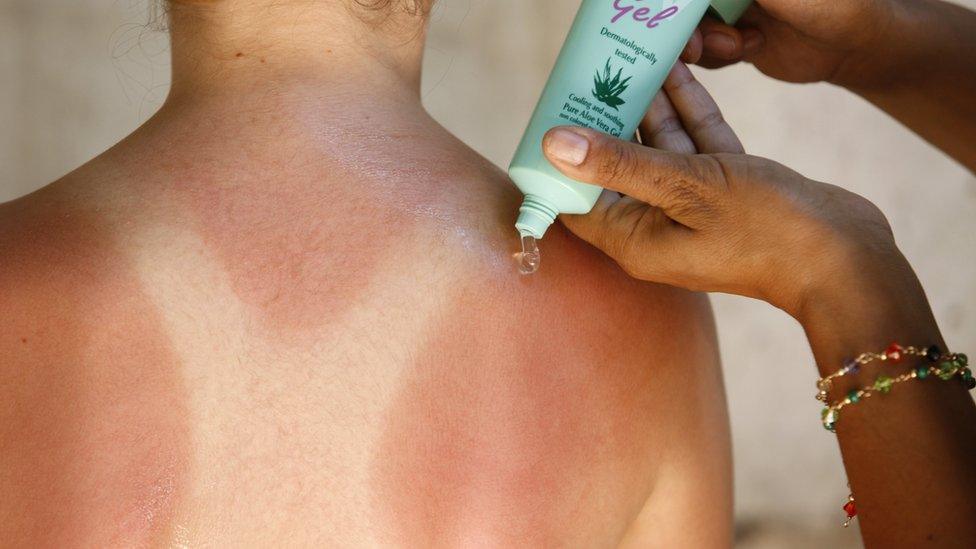
Parents want to be able to give permission for teachers to apply suncream in schools
Apart from sunburn being painful and unpleasant, Tenovus said melanoma (skin cancer) is one of the most common cancers affecting young adults (aged 15-34) in the UK.
According to the NHS, about 13,500 new cases of melanoma are diagnosed each year among people of all ages. Melanoma can metastasize and spread to organs, while with non-melanoma this is rare.
Maura Matthews from Tenovus said the charity "wants every child in Wales to be taught how to be safe in the sun" and "would like the Welsh Government to make this compulsory in schools".
"We know that skin cancer is the most preventable of all cancers," she said.
"We believe that every school should be sun safe accredited and every child in Wales should be taught these essential sun safety skills."
She added 86% of skin cancer cases are preventable.
Exposure to ultraviolet (UV) light, external is thought to cause most melanomas. The type of exposure that causes melanoma is sudden intense exposure - for example, while on holiday, which leads to sunburn.
Skcin, external says rates of skin cancer are increasing faster than any other cancer in the UK, with figures doubling every 10-20 years, and more people die of it in the UK than in Australia.
- Published28 June 2019
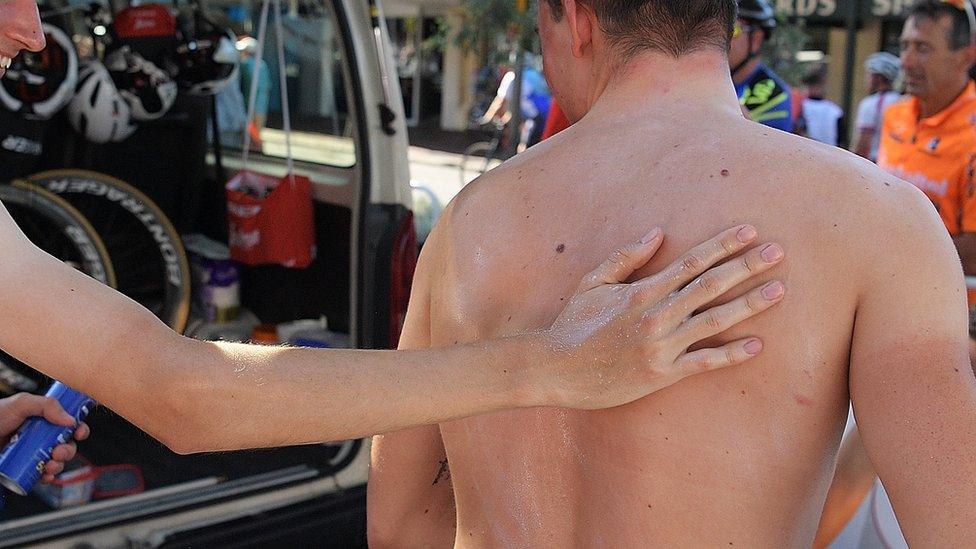
- Published1 November 2018
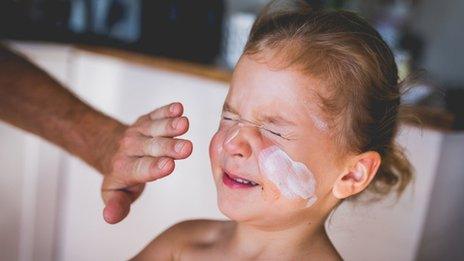
- Published15 July 2011
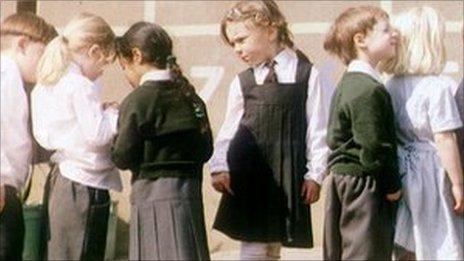
- Published29 May 2012
